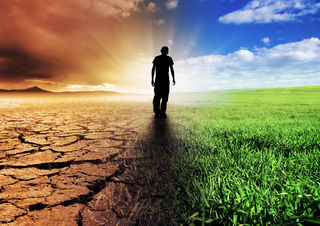Environment
A Changing Climate Is Transforming Our Emotional Well-Being
Climate change may already be reshaping the emotional landscape of our lives.
Posted September 12, 2018

Hurricanes. Flooding. Wildfires. It’s well-known that extreme weather events can affect the psychological well-being of individuals and communities. What’s less widely recognized is that gradual, ongoing climate changes may take a psychological toll as well. And you don’t have to live in the path of a natural disaster to be impacted, according to a review article published last month in the International Journal of Environmental Research and Public Health.
“The mental health outcomes of climate change are wide-ranging and complex,” says Katie Hayes of Toronto’s Dalla Lana School of Public Health, lead author of the provocative article. “We need to find ways to support and enhance psychosocial adaptation and resilience to our changing climate.”
Who’s Affected and How?
Catastrophic weather events can take lives, destroy homes, and displace whole communities. In the aftermath, mental health issues such as anxiety, depression, and post-traumatic stress disorder tend to increase. Hayes notes that extreme weather events can also bring out the best in people, fostering compassion, altruism, and a sense of community. But these positive feelings are often jumbled up with stress, grief, and a sense of loss, she says.
Even those who never experience an acute weather emergency may be chronically stressed by ongoing shifts in climate. Hayes says that some groups are particularly vulnerable to the insidious effects of climate change, including:
- People who live in areas affected by rising sea levels or melting permafrost. As an example, Hayes points to indigenous communities in northern Canada, where such issues “can lead to fears and anxieties related to displacement and food insecurity.”
- People who work outdoors. For some, a heat wave or drought means miserable working conditions; for others, loss of income and the stress associated with that. In one study, Australian farmers reported an overwhelming sense of loss in the face of prolonged drought.
- First responders to weather emergencies. “Some may be exposed more frequently to extreme events such as wildfires, floods, and hurricanes,” says Hayes. This may lead to a rise in stress and anxiety levels.
- Individuals who spend a lot of time thinking about climate change issues. Climate change researchers, environmental studies students, and environmental activists may fall into this group. Some heavy consumers of media reports about climate change may as well. Given the complexity of the problem, it’s all too easy to end up feeling helpless and hopeless.
“I know that, for myself, I often fall into this last category,” Hayes says. “The more I learn and research about climate effects on planetary and public health, the more fear, anxiety, stress, and worry I sometimes have about our ability to gain any traction on addressing the problem.”
Countering Fatalistic Thinking
Hayes says the best way to counter this kind of anxiety is by engaging with the problem and doing something constructive about it. That could mean weatherizing your home, buying energy-efficient appliances, using public transportation, voicing your concerns to elected officials, or all of the above.
Hayes suggests connecting with others who share your priorities. You may find them in your neighborhood, your faith community, an environmental group—perhaps even around your own kitchen table.
“By engaging with a community where we feel safe and comfortable, we can talk openly about climate effects and seek ways to act on climate change,” Hayes says. She notes that this sense of collective action helps us feel more powerful and enhances psychological resilience.
Hayes adds, “As much as we may want to turn away from the climate change issue to avoid feeling helpless and hopeless, that only allows us to ignore the realities of our situation. My advice is to stay engaged, to gather with your community, and to act.”
References
Hayes, K., & Poland, B. (2018). Addressing mental health in a changing climate: Incorporating mental health indicators into climate change and health vulnerability and adaptation assessments. International Journal of Environmental Research and Public Health, 15(9), 1806. doi:10.3390/ijerph15091806


